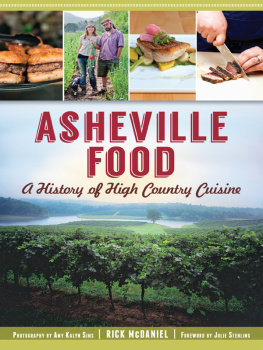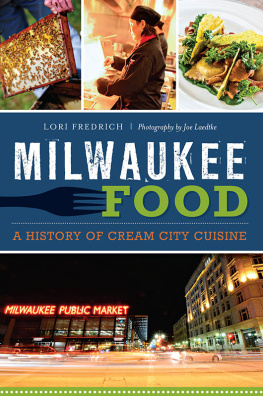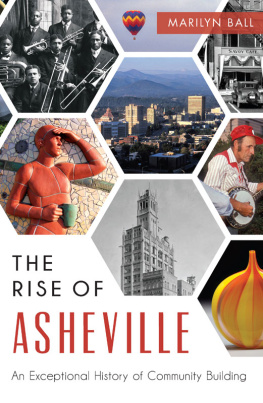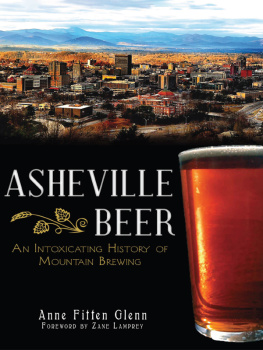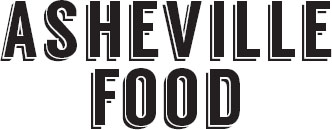
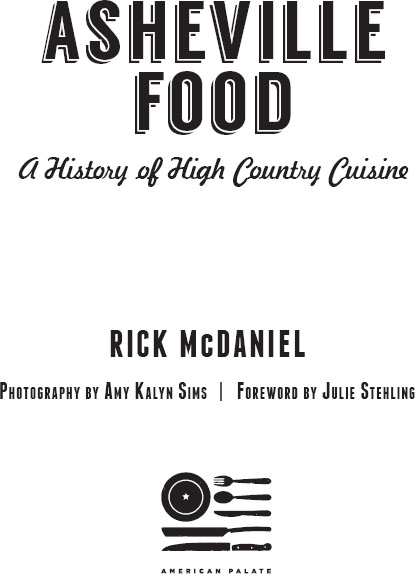
Published by American Palate
A Division of The History Press
Charleston, SC 29403
www.historypress.net
Copyright 2013 by Rick McDaniel
All rights reserved
First published 2013
e-book edition 2013
Manufactured in the United States
ISBN 978.1.62584.009.7
Library of Congress Cataloging-in-Publication Data
McDaniel, Rick.
Asheville food : a history of High Country cuisine / Rick McDaniel ;
photography by Amy Kalyn Sims.
pages cm
Includes bibliographical references and index.
print edition ISBN 978-1-60949-865-8 (paperback)
1. Restaurants--North Carolina--Asheville. 2. Farms--North Carolina--Asheville. 3. Local foods--North Carolina--Asheville. 4. Markets--North Carolina--Asheville. 5. Breweries--North Carolina--Asheville. 6. Wineries--North Carolina--Asheville. 7. Food--North Carolina--Asheville--History. 8. Cooking--North Carolina--Asheville--History. 9. Asheville (N.C.)--Social life and customs. 10. Asheville (N.C.)--Description and travel. I. Title.
TX907.3.N82A745 2013
641.5975688--dc23
2013030399
Notice: The information in this book is true and complete to the best of our knowledge. It is offered without guarantee on the part of the author or The History Press. The author and The History Press disclaim all liability in connection with the use of this book.
All rights reserved. No part of this book may be reproduced or transmitted in any form whatsoever without prior written permission from the publisher except in the case of brief quotations embodied in critical articles and reviews.
To the chefs, farmers, locals and tourists who make Asheville one of the best places on Earth to live and eat.
CONTENTS
FOREWORD
My husband, John, and I opened Early Girl Eatery in downtown Asheville on October 13, 2001. On October 14, Rick McDaniel walked in our door and ordered his first of many pumpkin gingerbread breakfasts.
Asheville was quieter back then, happening but not bustling. You could count the farmers markets on one hand and easily know every street musician by name. For John and me, life was very busy, and we were never not cooking, bussing tables or serving guests. Rick was writing for the Asheville Citizen-Times.
Rick knew everyone in the restaurant business, and he knew food. He wrote an article on Early Girls first anniversary that is still the best piece out there to truly capture who we are and what Early Girl set out to be. Rick is passionate about regional food just as you expect a Southerner to be, but more so. He knows his chow chow and his gravy and the history behind every variety out there. His cookbook, An Irresistible History of Southern Food, and websites (ChefRick.com and Hushpuppynation.com) are testaments to both his vast knowledge and his irresistible sense of humor. Over the years he has been an active participant and a witness to the blossoming of Ashevilles food scene.
During an economic downturn that has left so many towns scrambling, Asheville has defined itself and grown. The communitys desire for sustainable food systems and protected landscapes has helped launch nonprofits that help small farms thrive. The collision of local demand and farmers bounty with the creative culture of independent business has created something worth emulating. Organic growers, hot sauce makers, servers, butchers and food photographers are all making a living working with local resources.
At Early Girl, we have been buying from many of the same farmers for almost twelve years. Working together we now have successful business stories and growing families. In the meantime, more and more chefs have arrived and more farms have grown and prospered. Farmers inspire us, and hopefully we inspire them. Ashevilles restaurants deservedly draw rave reviews from national critics. Their success has, in part, been a product of an agricultural infrastructure needed for a seamless farm-to-table culture. The creative collaboration between chefs and growers resulted in a ballooning farm-to-table synergy in Ashevilleover the past decade, in particular.
It now takes a full typed page to list all of our regions tailgate markets. John and I now get enough time off to work on opening a new restaurant, King Daddys Chicken and Waffle. Street musicians I knew by name have put out albums and now populate our dining room next to tourists and council members, all expecting ramps in spring, strawberries in early summer and local, grass-fed beef all year round.
And my friend Rick gets to share the story of how a small Appalachian town came to offer so much exciting food and opportunity. And thats delicious in and of itself.
JULIE STEHLING
Co-owner, Early Girl Eatery and King Daddys Chicken and Waffle
Board of Directors, Appalachian Sustainable Agriculture Project
ACKNOWLEDGEMENTS
This book is the result of a carefully planned happy accident.
I had actually started the research for a completely different book when I got a call from my editor at the time, who told me about a series of books The History Press was planning about the local food scene in a series of cities across the country and asked if I would write the one for Asheville.
I have to admit I was a bit reluctant at first. While I thought it was a pretty cool project, I already had my mind wrapped around the other book. The more I thought about how Asheville had changed from a meat and three (canned) vegetable town into a true destination for culinary tourism, I realized that almost all of the people who had made that happen were friends of mine, and I was the one who could best tell their story because I already knew the story.
I owe many thanks to Banks Smither, my current editor at The History Press, and to his predecessor Jessica Berzon, who has since moved on to other pastures.
The best thing Banks ever did for me was to hire Amy Kalyn Sims as my photographic collaborator on this project. She is a consummate professional and a completely amazing master of light, shadow and color, and the photographs in this book are amazing.
My wife, Polly, did her usual yeoman service as preliminary editor, head cheerleader and chief talk-Rick-down-from-the-ledge person. She was always there with soothing words of encouragement (and a double Scotch, at times) when I was pacing the floor moaning, Theres no way in the name of God Im ever gonna finish this thing in time!
The story of food in Asheville cannot be told without acknowledging the contributions over more than a century by George Washington Vanderbilt and his Biltmore Estate, the magnificent 250-room mansion he built at the close of the nineteenth century. From state-of-the-art kitchen appliances to elegant Edwardian feasts to pioneering work in sustainable agriculture that is still in practice today, Mr. Vanderbilt, his descendants and the generations of staff at the estate have made their mark on dining in Asheville. LeeAnn Donnelly and Marissa Jamison in the media relations department were great helps in putting me in touch with experts and securing photographs. Darren Poupore, chief curator at Biltmore Estate, and his staff were extremely generous with time and information, as was Estate Historian Bill Alexander. The information in , Dining at Biltmore, was almost entirely based on research done by estate curators.
Jessica Furst of the Special Collections staff at the D.H. Ramsey Library at the University of North CarolinaAsheville was extremely helpful in accessing historic photographs from the E.M. Ball Photographic Collection. The collection also held a wonderful oral history from Billie Walker Tingle, whose family were restaurateurs at the dawn of the twentieth century and owned the iconic Tingles Cafe. This was a treasure-trove of information on early Asheville restaurants.
Next page
